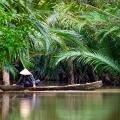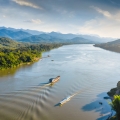Rising seas, resilient voices: A school’s fight for survival in Samut Prakan, Thailand
Among a mangrove forest threatened by rising sea levels, a small elementary school is a lifeline for climate resilience, providing education to five children from a disappearing indigenous fishing village in Thailand’s Samut Prakan province.
As coastal erosion worsens, the local people in Samut Prakan province along the Gulf of Thailand, face growing pressure to leave, but with no relocation plans for their future.
Many of these families are fishers who spend long hours out in the sea often with meagre returns or spend their days sorting oysters. For these families, a school nestled among the mangroves offers both peace of mind and a reminder of climate resilience. The school provides basic education, equipping children aged 9 to 12 to pursue their learning despite uncertainty due to the rising sea levels.

Many families spend their days sorting oysters to get some cash income. Photo: Renz Prudenciado / ReTrEAT Cities Project.
“Education teaches children not only reading and writing but also life by the sea and the environmental challenges it brings,” said Suwan Buaplai, a local marine conservationist in the coastal community of Samut Prakan.
But he also noted the gap: no member of the village has been able to pursue higher education in fields like human rights or marine biology—fields that are critical for tackling environmental challenges.
Preparing for sea-level rise
The school equips children to better understand the risks from rising sea levels and climate change.
The agency and voices of young people are crucial in shaping decisions that affect their families and futures, especially when advocating for their rights as coastal residents, as emphasized by the local marine conservationist.
Wisanu Kengsamut, a community leader, emphasized how young people have made a powerful impact in their local collective advocacies.
The government and the people are hearing our struggles because of youth voices. Social media helps stories of our struggles to reach wider audiences – Kengsamut said.
Across Thailand, localized education is empowering youth to build climate resilience and enable climate action in coastal areas.

Map showing one of the project sites in the Lower Mekong Region. Photo: Renz Prudenciado / ReTrEAT Cities Project.
Healing from trauma of past violence
Beyond the threat of rising sea levels, a more immediate danger has already left deep scars for the local communities in Samut Prakan.
This is the often-overlooked conflicts between the landowners and the community over land-use and fish harvests. Kengsamut noted how landowners often used violence and aggressive coercion to threaten the communities over their fish collection livelihoods. This has a severe impact not only on local livelihoods but also on the mental health of male members in the community.
"While we worry about the land disappearing beneath our feet, this kind of aggression—this threat to our dignity and safety—has been just as damaging," Kengsamut emphasized.
But as they face these challenges, the community is determined that the next generation of children will not have to endure the same violence.
The men are often expected to stand up for the community but the violence from the landowner conflicts can leave them broken, fearful, and unable to protect their families.
The school’s lessons of respect and inclusion aim to break the cycles of violence and help the community to heal, fostering future generations to live in peace even as they grapple with the risks of sea-level rise.

A young student returns to class after playing outside in the mangrove forest. Photo: Renz Prudenciado / ReTrEAT Cities Project.
Building inclusive resilience
In Samut Prakan, a small school in the mangrove forest is helping to prepare the next generation to face these challenges head-on. Through education, community involvement, and advocacy, these children are learning not only to read and write but also to understand and protect the world around them.
In the words of one local conservationist Buaplai, who is also a local fisher:
“This school is more than just a place to learn. It’s a place where our young people can grow, take pride in their heritage, and be empowered to protect our very own home."
Amid sinking coastal homes, the school’s nurturing of youth agency through education and involvement offers hope for a more resilient and more gender and social inclusive future for indigenous fishing villages in Samut Prakan and beyond.
This blog is a reflection from the ReTrEAT Cities Project, which supports vulnerable coastal communities in the Mekong Region, including Thailand, Cambodia, and Vietnam.
Cover photo: The school in the mangrove forest fishing village, one hour after high tide, standing on the now-dry seabed.
Info
This story is part of the following project
Mekong Thought Leadership and Think Tanks Network
Topic
Country
Related people
You might be interested in
-
Grants open for research linking to policy action under Mekong Thought Leadership and Think Tanks Network Program
Mekong Thought Leadership and Think Tanks (MTT) Network Program calls for applications to its research-to-policy grants supporting evidence-based research that connects to practical solutions to challenges in the water-energy-climate nexus.
![Grants open for research linking to policy action under Mekong Thought Leadership and Think Tanks Network Program]()
-
Now open: fellowship opportunities under Mekong Thought Leadership and Think Tanks Program
MTT Program is opening a call for fellowships to be hosted in Cambodia, Lao PDR, Thailand, and Vietnam. The Program will award up to 13 high-quality entry- or mid-level professionals of all genders who are Mekong citizens.
![Now open: fellowship opportunities under Mekong Thought Leadership and Think Tanks Program]()
-
Call for 3rd batch applications: fellowship opportunities under Mekong Thought Leadership and Think Tanks Program
MTT Program is opening a call for fellowships to be hosted in Cambodia, Lao PDR, Thailand, and Vietnam. The Program will award up to 13 high-quality entry- or mid-level professionals of all genders who are Mekong citizens.
![Call for 3rd batch applications: fellowship opportunities under Mekong Thought Leadership and Think Tanks Program]()

 By
By




 Read more about SUMERNET
Read more about SUMERNET
